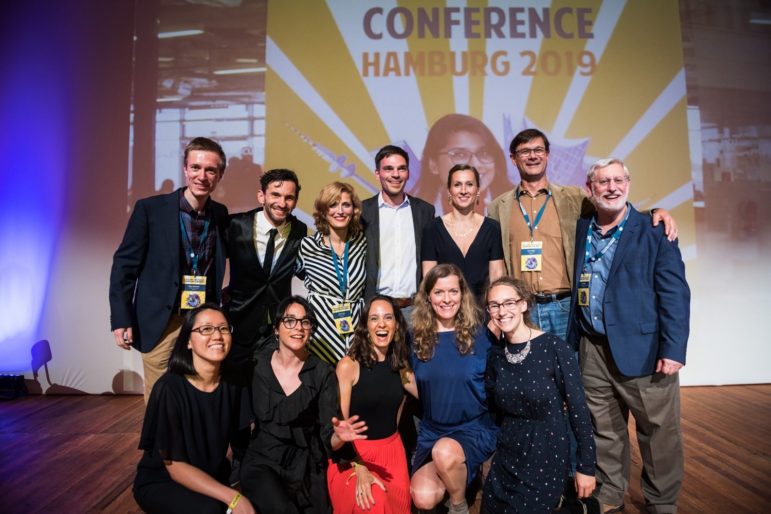How did I end up talking about empathy, compassion, and how to help each other in front of a crowd at the farewell of the 11th Global Investigative Journalism Conference that just ended in Hamburg, Germany?
Maybe we should rewind to the previous conference (GIJC17), where I was literally watching from home close to my second baby’s due date, after working all year on it. Or rewind to the conference before that one (GIJC15), when I went to Norway with husband and still-breastfed baby in tow, with said baby babysat in a crowdsourced effort by various journalists and foundation people. (Bonus points for our German partners at Netzwerk Recherche for setting up a daycare service at GIJC19. More about work/life balance in this NiemanLab article.) Or maybe turn back the clock to Rio de Janeiro (GIJC13), where everything started for me. That was the first time I met this extended family, one that meets every two years at the global conferences.
In fact, we should probably just go back a year ago, when we started those conference calls with the “German team.” (Sorry, NR guys, I will never learn to pronounce your name, even after attending two of your wonderful national conferences.) How to forget our countless tasks on Asana (our project management platform), our conference memes, and those sometimes endless conference calls across three continents.

Hint: I think we managed to almost fill the bingo.
How did I end up talking about helping each other, leaving behind big egos and competition, to focus on the greater mission of investigative journalism? Just a few hours earlier, Maria Ressa had received a standing ovation, and her words were still resonating in the hallways: “An attack on one is an attack on all … Newsrooms are born to compete, but what we’re not seeing is that we’re no longer competing against each other — we’re competing against disinformation networks. We’re competing to tell the facts.” Her speech should be mandatory reading in all journalism schools.
In this year’s conference, for the first time, we had an all-women panel focusing on the unique challenges they face. A topic that is pertinent and essential. A conference with a woman keynote speaker, presented by another woman. Sisterhood is here to stay. This was also a conference with gender balance, both in terms of speakers and attendees. And importantly, it was a conference in which achieving this balance was not just a challenge but a priority and then a reality.
This conference broke all our records: It was 50% larger than our last gathering, with more than 1,700 attendees from 130 countries coming together for five days to share knowledge, collaborate, and find new connections. So many new faces joining this big investigative family. I hope all our attendees are generous enough to go back to their newsrooms and share and inspire those who could not come. For sure, one of the hardest tasks in the last few weeks was sending those awful replies: Sorry, we’re totally sold out.
I won’t sugarcoat it: Hosting so many people brought its own challenges. The effect that mobile screens and information overload are having on all of us (myself included) is worrisome, to say the least. How can we keep our priorities in order when we have this overabundance of platforms in which we can communicate? I witnessed journalism burnout as never before.
The tough working conditions, the layoffs, the survival day-by-day, all contribute to that. We’d better keep addressing the effect that all these pressures have on us, before more people lose the ability or mental capacity to even read an email from start to end. Hint: How about a meditation/quiet room for the next conference? As one dear friend, who’s part of the GIJC extended family, told me: “I see so many tired people … tired inside, and weary in their hearts.”
We need to take care of ourselves. What investigative journalists do is too important. We are not normal people. It’s not a 9-to-5 job. It’s a job that only passionate people can do. But we need to make sure that passionate people stay sane and healthy.
And now, before I throw away this cell phone, go off the grid, and allow my brain to detox and resettle, let me share a few images that reflect the spirit of this amazing conference.

Günter Barsch, Managing Director of NR, biking a speaker around Hamburg to solve a last-minute issue. Too much traffic for a taxi, resourceful solution. Photo: Raphael Hünerfauth

Eunice Au, GIJN Program Coordinator, found that the only way to keep her computer alive long enough to last to the end of the week, was to never close it. Hint: Not an easy task while you’re walking across venues under the rain.

Katharina Finke, from NR, and Manfred Redelfs moving boxes around. Later on, it would be band equipment.

Franziska Senkel, from NR, putting up a banner after a sleepless week designing the printed program and venues maps.

How many hours can people go without sleep? Cora Moyano and Eunice Au tested it.

Gold stars for Julia Stein’s sharp comments, many of which we considered deserved to be on a t-shirt. Women power. Photo: Raphael Hünerfauth

The German dynamic duo: Günter Barsch and Thomas Schnedler. Photo: Nick Jaussi

A 30-country newsroom in full action. Illustration: Phil Ninh

The GIJN team working nonstop. Photo: Nick Jaussi
Time to wrap up. But before that, another confession. I haven’t written a story for quite a long time now. I cannot even remember when the last time was. But somehow, while I was waiting for my plane to return home from Hamburg (after a flight cancellation), I had this sudden urge to put my thoughts on paper. This conference was not just the biggest one in terms of number of attendees. It was such an intense experience on so many levels. And I know this is true not just for me, but for the majority of people who shared those venues for five days.
And now, one of the most difficult parts of each conference: Saying goodbye to the local host team, after a year of working together almost daily. A huge thanks to everybody who worked so hard. You know who you are; too long for a list. But my deep appreciation for the inner core of organizers, the Asana/Zoom team: David Kaplan (who, in 2013, rescued me from the immense struggle of freelancing work, and gave me the life-changing opportunity to join GIJN), Cora Moyano, Eunice Au, Anne Koch, Julia Stein, Gunter Barsch, Thomas Schnedler, Katharina Finke, Franziska Senkel, and Werner Eggert.

Now, it’s time for all of you to take what you have learned and put it into practice back home and embrace the big shared responsibility that comes with this one-of-a-kind job of being an investigative journalist. A job that cannot be done alone anymore. Collaboration is needed more than ever. But while you are out there exposing the corrupt and evil of the world, don’t forget to rest and take care of yourself.
Tschüss!
 Gabriela Manuli is the Deputy Director of the Global Investigative Journalism Network. A native of Argentina, Gabriela Manuli has been a journalist for more than 15 years, working for radio, TV, magazines, and newspapers.
Gabriela Manuli is the Deputy Director of the Global Investigative Journalism Network. A native of Argentina, Gabriela Manuli has been a journalist for more than 15 years, working for radio, TV, magazines, and newspapers.
